Taxation Law Homework: Income, Deductions, and Tax Liability for 2020
VerifiedAdded on 2022/10/15
|7
|1156
|99
Homework Assignment
AI Summary
This taxation law assignment solution analyzes the tax implications for Thomas Hawks, a tax accountant, for the year ended June 30, 2020. The solution addresses the classification of income from his personal service business, applying relevant sections of the ITA Act 1936 and ITAA 1997, along with case law such as McNeil v FC (2007). It examines the application of the cash method for income recognition and the deductibility of home office expenses, referencing TR 93/30 and Swinford v FCT (1984). Additionally, the assignment addresses the tax treatment of compensation payments and the receipt of non-cash assets. The solution includes a detailed computation of Thomas Hawks' assessable income, allowable deductions, and total tax liability, providing a comprehensive understanding of the tax principles involved.
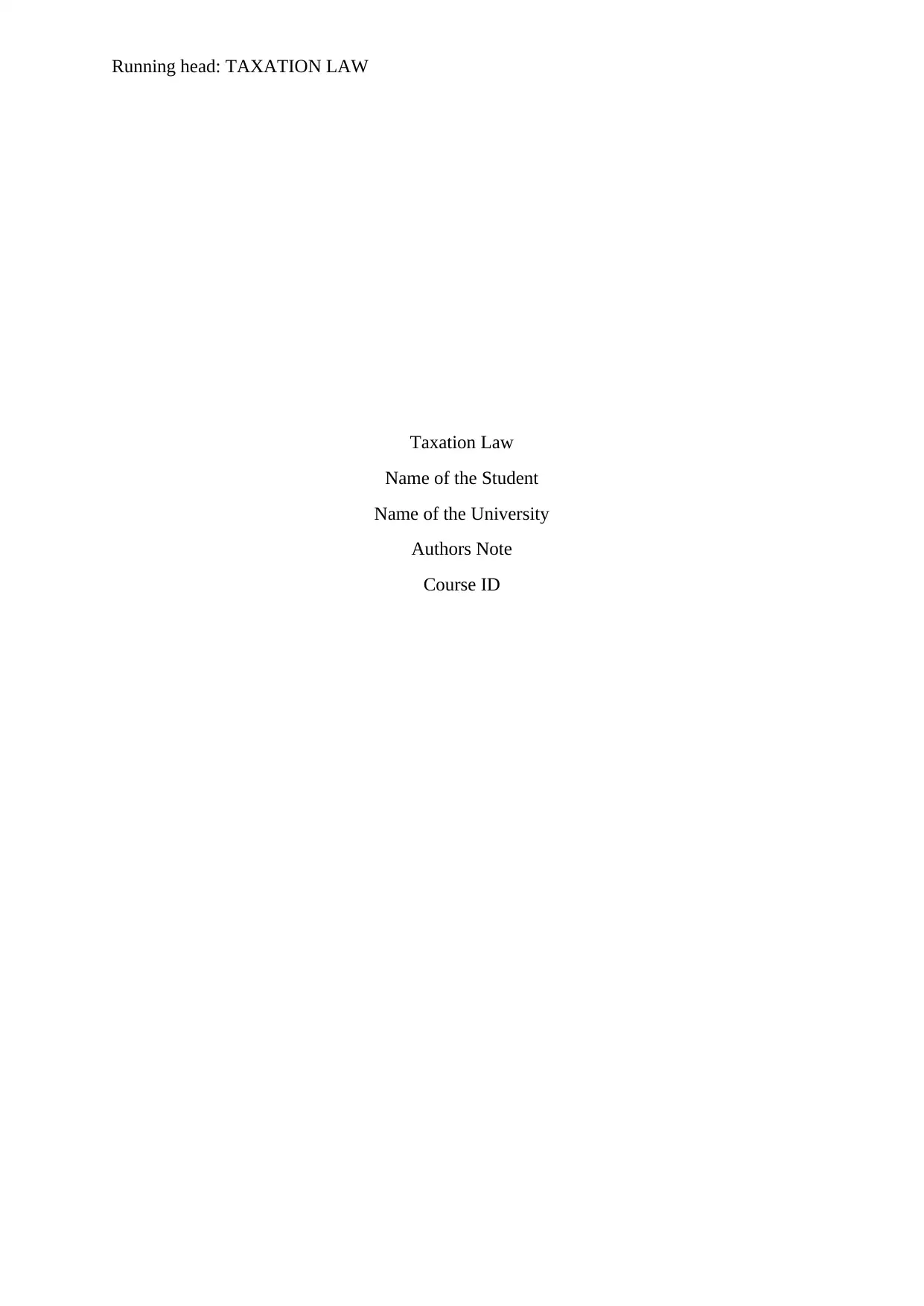
Running head: TAXATION LAW
Taxation Law
Name of the Student
Name of the University
Authors Note
Course ID
Taxation Law
Name of the Student
Name of the University
Authors Note
Course ID
Paraphrase This Document
Need a fresh take? Get an instant paraphrase of this document with our AI Paraphraser
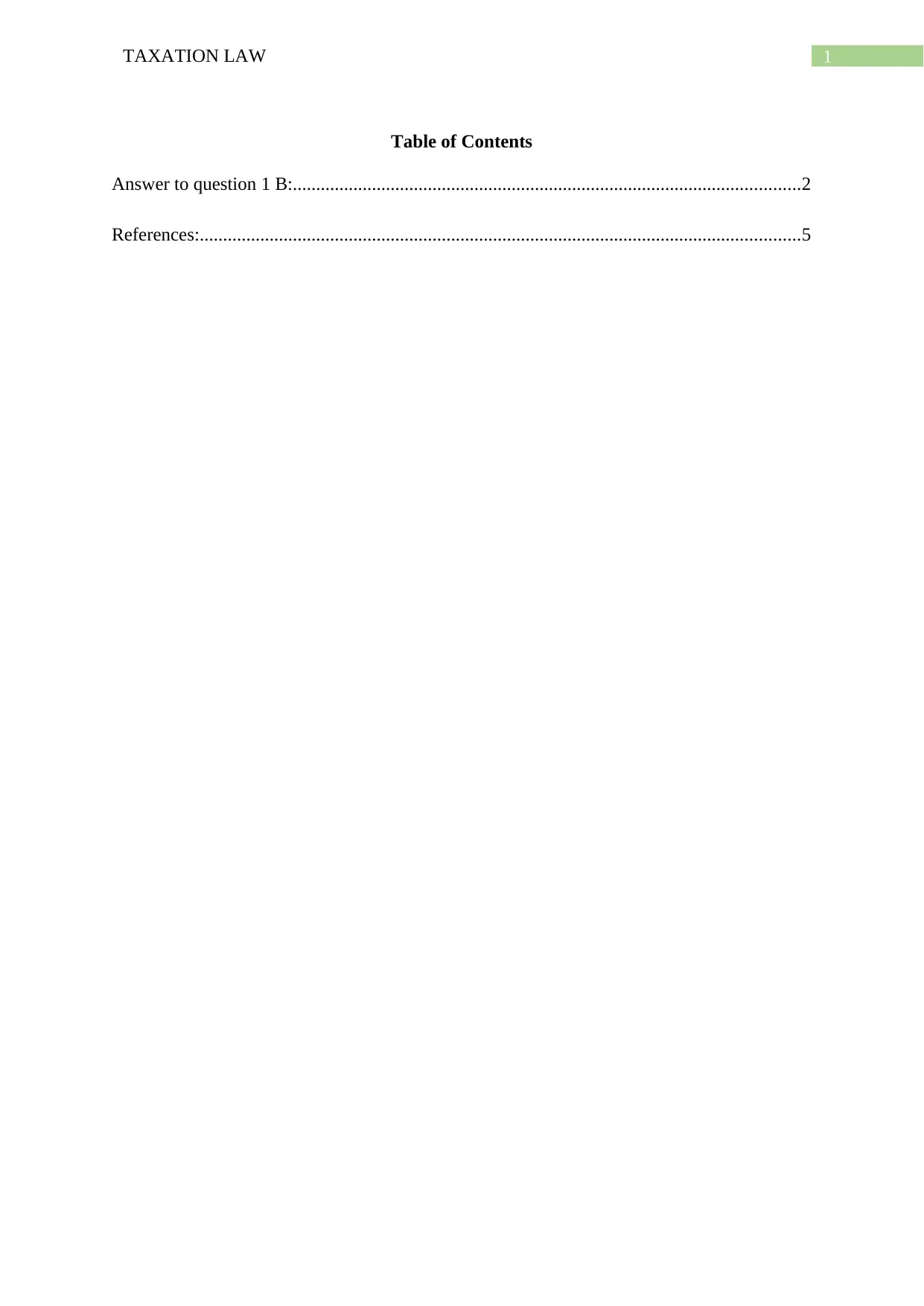
1TAXATION LAW
Table of Contents
Answer to question 1 B:.............................................................................................................2
References:.................................................................................................................................5
Table of Contents
Answer to question 1 B:.............................................................................................................2
References:.................................................................................................................................5
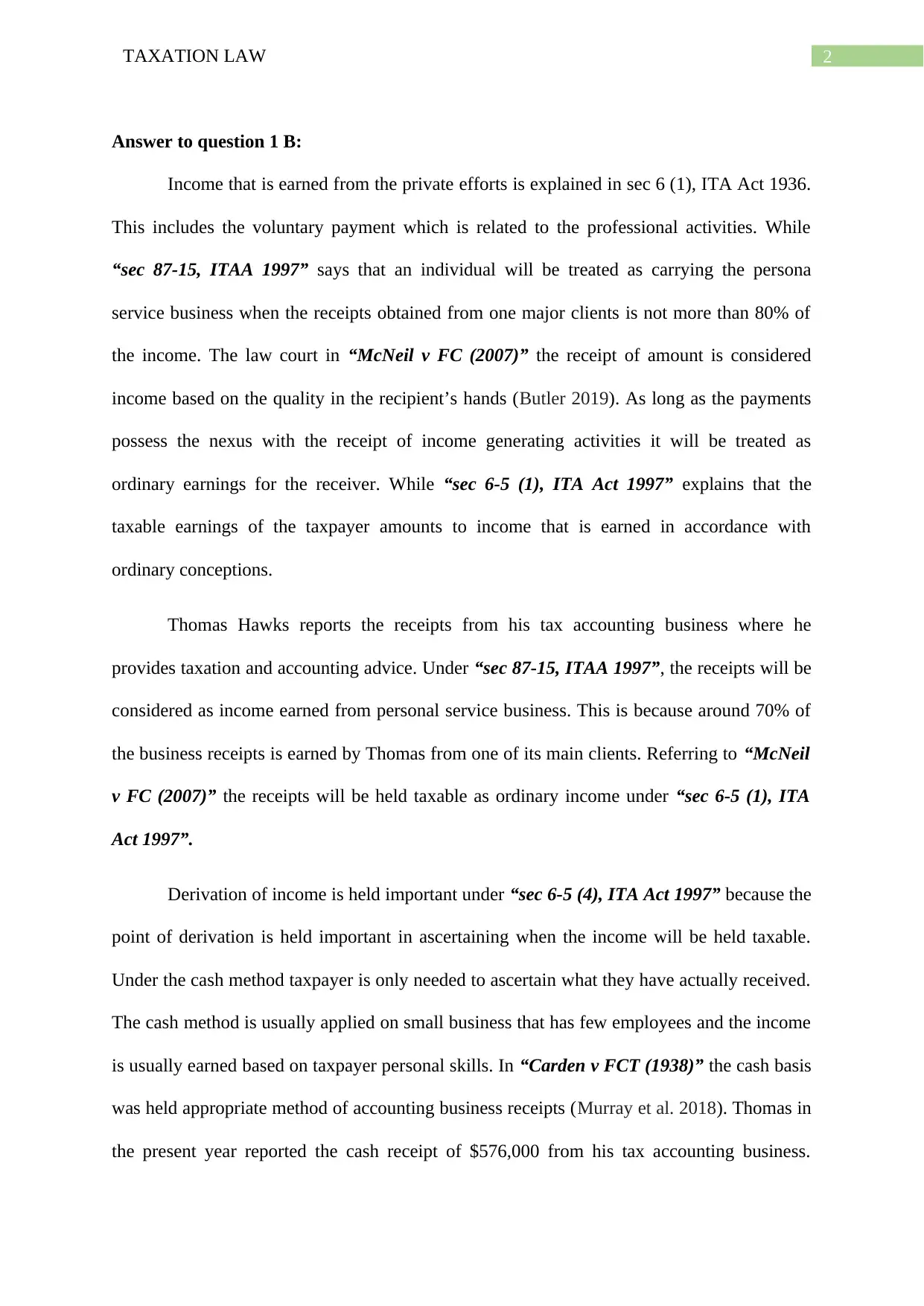
2TAXATION LAW
Answer to question 1 B:
Income that is earned from the private efforts is explained in sec 6 (1), ITA Act 1936.
This includes the voluntary payment which is related to the professional activities. While
“sec 87-15, ITAA 1997” says that an individual will be treated as carrying the persona
service business when the receipts obtained from one major clients is not more than 80% of
the income. The law court in “McNeil v FC (2007)” the receipt of amount is considered
income based on the quality in the recipient’s hands (Butler 2019). As long as the payments
possess the nexus with the receipt of income generating activities it will be treated as
ordinary earnings for the receiver. While “sec 6-5 (1), ITA Act 1997” explains that the
taxable earnings of the taxpayer amounts to income that is earned in accordance with
ordinary conceptions.
Thomas Hawks reports the receipts from his tax accounting business where he
provides taxation and accounting advice. Under “sec 87-15, ITAA 1997”, the receipts will be
considered as income earned from personal service business. This is because around 70% of
the business receipts is earned by Thomas from one of its main clients. Referring to “McNeil
v FC (2007)” the receipts will be held taxable as ordinary income under “sec 6-5 (1), ITA
Act 1997”.
Derivation of income is held important under “sec 6-5 (4), ITA Act 1997” because the
point of derivation is held important in ascertaining when the income will be held taxable.
Under the cash method taxpayer is only needed to ascertain what they have actually received.
The cash method is usually applied on small business that has few employees and the income
is usually earned based on taxpayer personal skills. In “Carden v FCT (1938)” the cash basis
was held appropriate method of accounting business receipts (Murray et al. 2018). Thomas in
the present year reported the cash receipt of $576,000 from his tax accounting business.
Answer to question 1 B:
Income that is earned from the private efforts is explained in sec 6 (1), ITA Act 1936.
This includes the voluntary payment which is related to the professional activities. While
“sec 87-15, ITAA 1997” says that an individual will be treated as carrying the persona
service business when the receipts obtained from one major clients is not more than 80% of
the income. The law court in “McNeil v FC (2007)” the receipt of amount is considered
income based on the quality in the recipient’s hands (Butler 2019). As long as the payments
possess the nexus with the receipt of income generating activities it will be treated as
ordinary earnings for the receiver. While “sec 6-5 (1), ITA Act 1997” explains that the
taxable earnings of the taxpayer amounts to income that is earned in accordance with
ordinary conceptions.
Thomas Hawks reports the receipts from his tax accounting business where he
provides taxation and accounting advice. Under “sec 87-15, ITAA 1997”, the receipts will be
considered as income earned from personal service business. This is because around 70% of
the business receipts is earned by Thomas from one of its main clients. Referring to “McNeil
v FC (2007)” the receipts will be held taxable as ordinary income under “sec 6-5 (1), ITA
Act 1997”.
Derivation of income is held important under “sec 6-5 (4), ITA Act 1997” because the
point of derivation is held important in ascertaining when the income will be held taxable.
Under the cash method taxpayer is only needed to ascertain what they have actually received.
The cash method is usually applied on small business that has few employees and the income
is usually earned based on taxpayer personal skills. In “Carden v FCT (1938)” the cash basis
was held appropriate method of accounting business receipts (Murray et al. 2018). Thomas in
the present year reported the cash receipt of $576,000 from his tax accounting business.
⊘ This is a preview!⊘
Do you want full access?
Subscribe today to unlock all pages.

Trusted by 1+ million students worldwide
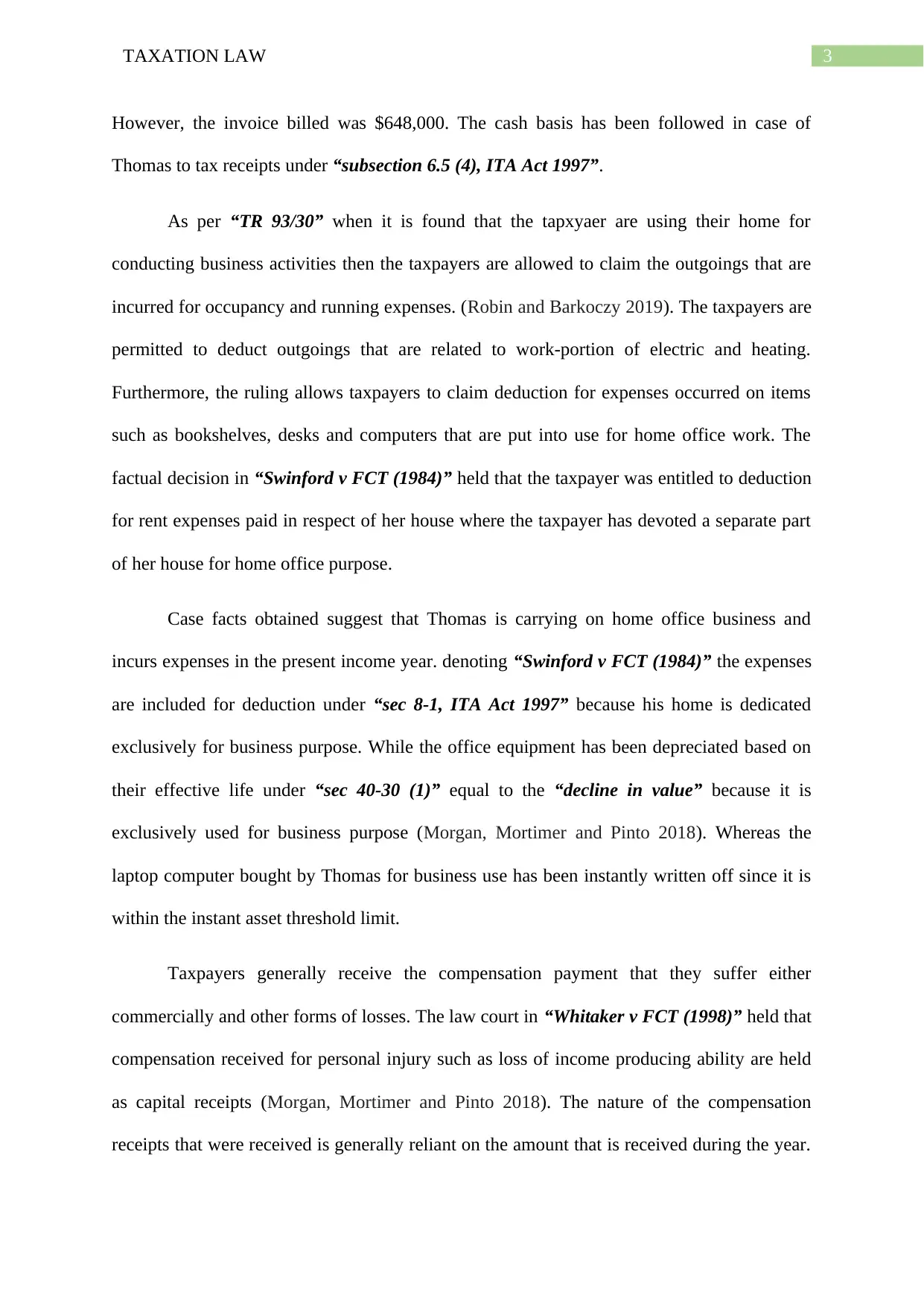
3TAXATION LAW
However, the invoice billed was $648,000. The cash basis has been followed in case of
Thomas to tax receipts under “subsection 6.5 (4), ITA Act 1997”.
As per “TR 93/30” when it is found that the tapxyaer are using their home for
conducting business activities then the taxpayers are allowed to claim the outgoings that are
incurred for occupancy and running expenses. (Robin and Barkoczy 2019). The taxpayers are
permitted to deduct outgoings that are related to work-portion of electric and heating.
Furthermore, the ruling allows taxpayers to claim deduction for expenses occurred on items
such as bookshelves, desks and computers that are put into use for home office work. The
factual decision in “Swinford v FCT (1984)” held that the taxpayer was entitled to deduction
for rent expenses paid in respect of her house where the taxpayer has devoted a separate part
of her house for home office purpose.
Case facts obtained suggest that Thomas is carrying on home office business and
incurs expenses in the present income year. denoting “Swinford v FCT (1984)” the expenses
are included for deduction under “sec 8-1, ITA Act 1997” because his home is dedicated
exclusively for business purpose. While the office equipment has been depreciated based on
their effective life under “sec 40-30 (1)” equal to the “decline in value” because it is
exclusively used for business purpose (Morgan, Mortimer and Pinto 2018). Whereas the
laptop computer bought by Thomas for business use has been instantly written off since it is
within the instant asset threshold limit.
Taxpayers generally receive the compensation payment that they suffer either
commercially and other forms of losses. The law court in “Whitaker v FCT (1998)” held that
compensation received for personal injury such as loss of income producing ability are held
as capital receipts (Morgan, Mortimer and Pinto 2018). The nature of the compensation
receipts that were received is generally reliant on the amount that is received during the year.
However, the invoice billed was $648,000. The cash basis has been followed in case of
Thomas to tax receipts under “subsection 6.5 (4), ITA Act 1997”.
As per “TR 93/30” when it is found that the tapxyaer are using their home for
conducting business activities then the taxpayers are allowed to claim the outgoings that are
incurred for occupancy and running expenses. (Robin and Barkoczy 2019). The taxpayers are
permitted to deduct outgoings that are related to work-portion of electric and heating.
Furthermore, the ruling allows taxpayers to claim deduction for expenses occurred on items
such as bookshelves, desks and computers that are put into use for home office work. The
factual decision in “Swinford v FCT (1984)” held that the taxpayer was entitled to deduction
for rent expenses paid in respect of her house where the taxpayer has devoted a separate part
of her house for home office purpose.
Case facts obtained suggest that Thomas is carrying on home office business and
incurs expenses in the present income year. denoting “Swinford v FCT (1984)” the expenses
are included for deduction under “sec 8-1, ITA Act 1997” because his home is dedicated
exclusively for business purpose. While the office equipment has been depreciated based on
their effective life under “sec 40-30 (1)” equal to the “decline in value” because it is
exclusively used for business purpose (Morgan, Mortimer and Pinto 2018). Whereas the
laptop computer bought by Thomas for business use has been instantly written off since it is
within the instant asset threshold limit.
Taxpayers generally receive the compensation payment that they suffer either
commercially and other forms of losses. The law court in “Whitaker v FCT (1998)” held that
compensation received for personal injury such as loss of income producing ability are held
as capital receipts (Morgan, Mortimer and Pinto 2018). The nature of the compensation
receipts that were received is generally reliant on the amount that is received during the year.
Paraphrase This Document
Need a fresh take? Get an instant paraphrase of this document with our AI Paraphraser
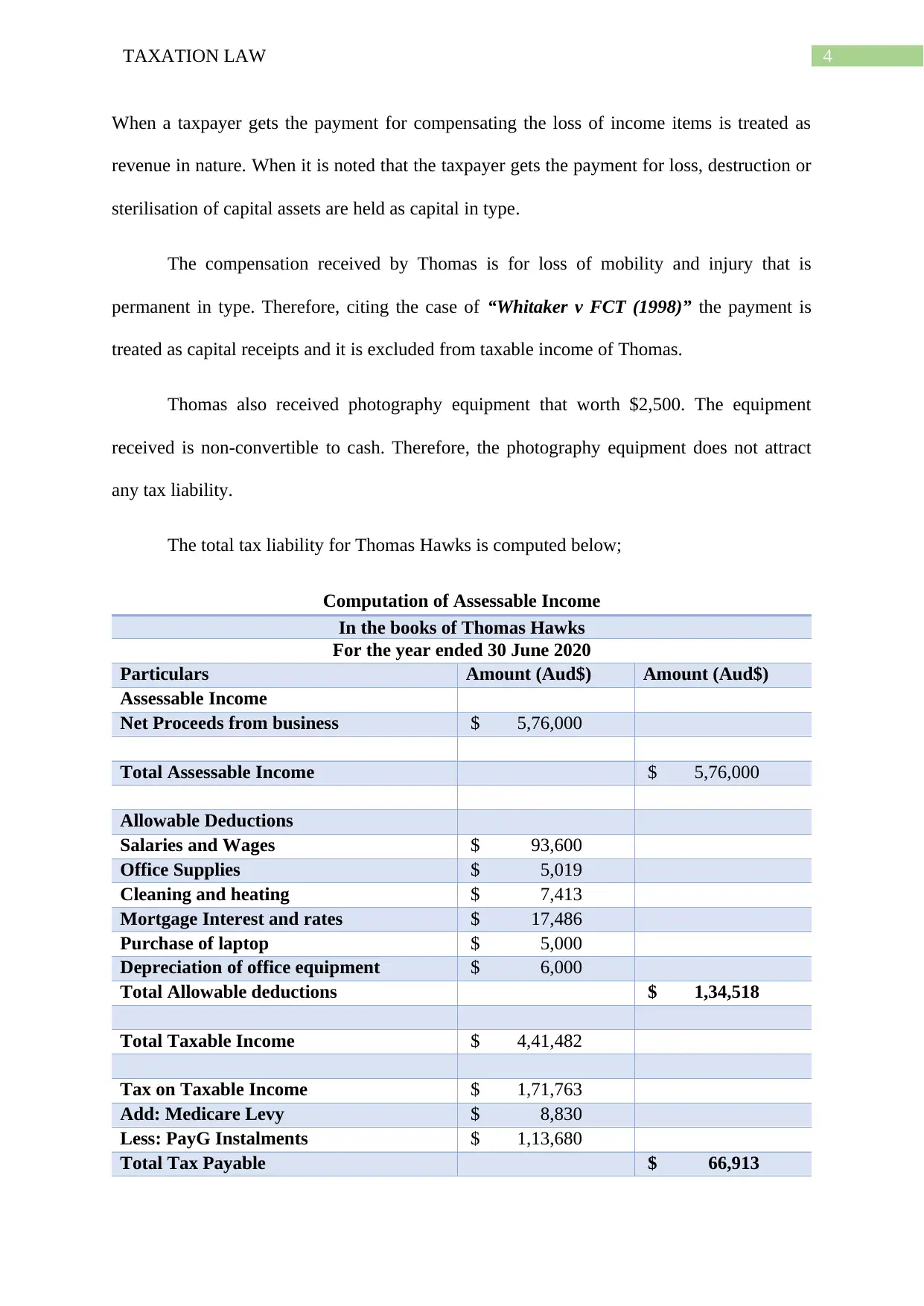
4TAXATION LAW
When a taxpayer gets the payment for compensating the loss of income items is treated as
revenue in nature. When it is noted that the taxpayer gets the payment for loss, destruction or
sterilisation of capital assets are held as capital in type.
The compensation received by Thomas is for loss of mobility and injury that is
permanent in type. Therefore, citing the case of “Whitaker v FCT (1998)” the payment is
treated as capital receipts and it is excluded from taxable income of Thomas.
Thomas also received photography equipment that worth $2,500. The equipment
received is non-convertible to cash. Therefore, the photography equipment does not attract
any tax liability.
The total tax liability for Thomas Hawks is computed below;
Computation of Assessable Income
In the books of Thomas Hawks
For the year ended 30 June 2020
Particulars Amount (Aud$) Amount (Aud$)
Assessable Income
Net Proceeds from business $ 5,76,000
Total Assessable Income $ 5,76,000
Allowable Deductions
Salaries and Wages $ 93,600
Office Supplies $ 5,019
Cleaning and heating $ 7,413
Mortgage Interest and rates $ 17,486
Purchase of laptop $ 5,000
Depreciation of office equipment $ 6,000
Total Allowable deductions $ 1,34,518
Total Taxable Income $ 4,41,482
Tax on Taxable Income $ 1,71,763
Add: Medicare Levy $ 8,830
Less: PayG Instalments $ 1,13,680
Total Tax Payable $ 66,913
When a taxpayer gets the payment for compensating the loss of income items is treated as
revenue in nature. When it is noted that the taxpayer gets the payment for loss, destruction or
sterilisation of capital assets are held as capital in type.
The compensation received by Thomas is for loss of mobility and injury that is
permanent in type. Therefore, citing the case of “Whitaker v FCT (1998)” the payment is
treated as capital receipts and it is excluded from taxable income of Thomas.
Thomas also received photography equipment that worth $2,500. The equipment
received is non-convertible to cash. Therefore, the photography equipment does not attract
any tax liability.
The total tax liability for Thomas Hawks is computed below;
Computation of Assessable Income
In the books of Thomas Hawks
For the year ended 30 June 2020
Particulars Amount (Aud$) Amount (Aud$)
Assessable Income
Net Proceeds from business $ 5,76,000
Total Assessable Income $ 5,76,000
Allowable Deductions
Salaries and Wages $ 93,600
Office Supplies $ 5,019
Cleaning and heating $ 7,413
Mortgage Interest and rates $ 17,486
Purchase of laptop $ 5,000
Depreciation of office equipment $ 6,000
Total Allowable deductions $ 1,34,518
Total Taxable Income $ 4,41,482
Tax on Taxable Income $ 1,71,763
Add: Medicare Levy $ 8,830
Less: PayG Instalments $ 1,13,680
Total Tax Payable $ 66,913
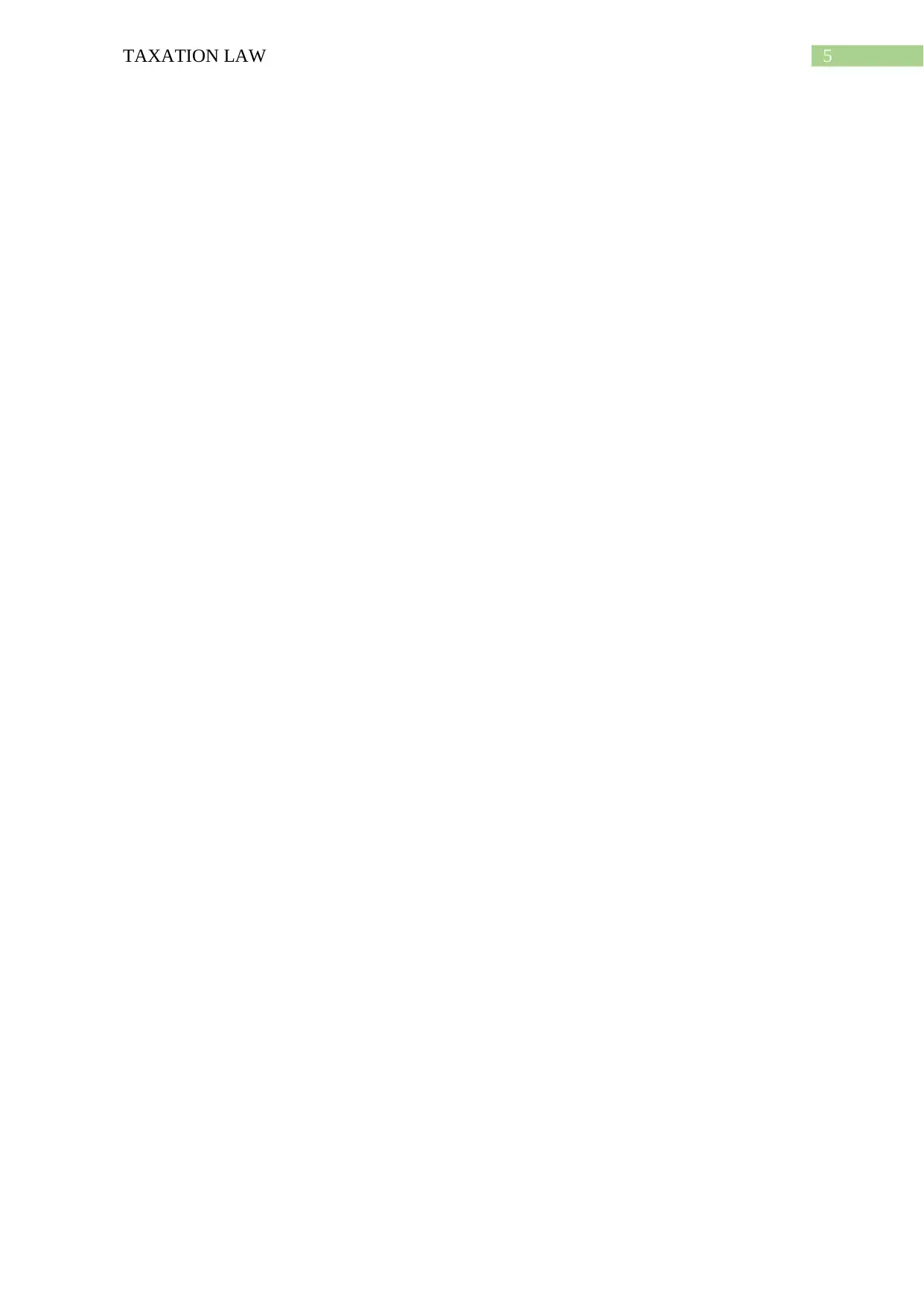
5TAXATION LAW
⊘ This is a preview!⊘
Do you want full access?
Subscribe today to unlock all pages.

Trusted by 1+ million students worldwide
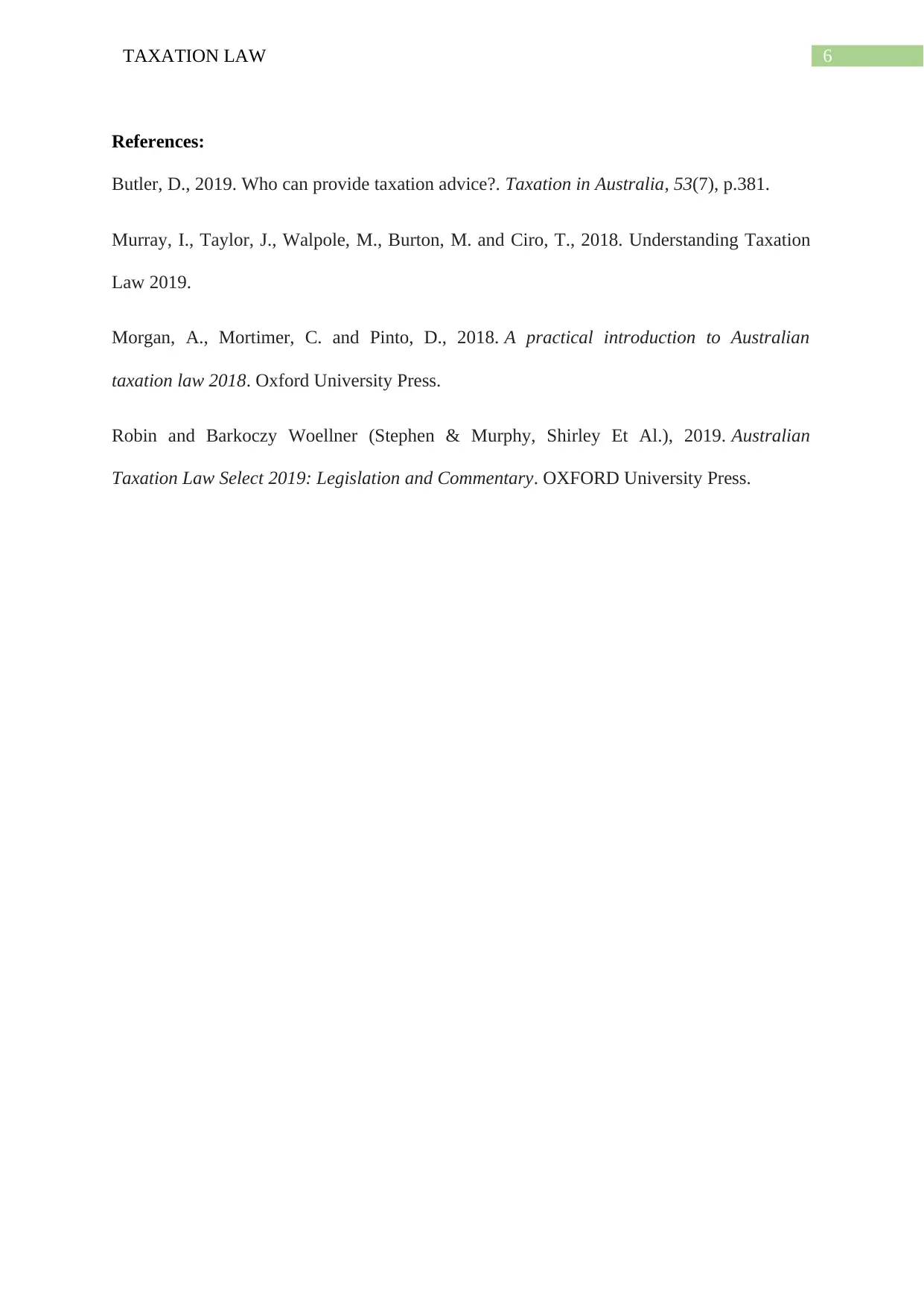
6TAXATION LAW
References:
Butler, D., 2019. Who can provide taxation advice?. Taxation in Australia, 53(7), p.381.
Murray, I., Taylor, J., Walpole, M., Burton, M. and Ciro, T., 2018. Understanding Taxation
Law 2019.
Morgan, A., Mortimer, C. and Pinto, D., 2018. A practical introduction to Australian
taxation law 2018. Oxford University Press.
Robin and Barkoczy Woellner (Stephen & Murphy, Shirley Et Al.), 2019. Australian
Taxation Law Select 2019: Legislation and Commentary. OXFORD University Press.
References:
Butler, D., 2019. Who can provide taxation advice?. Taxation in Australia, 53(7), p.381.
Murray, I., Taylor, J., Walpole, M., Burton, M. and Ciro, T., 2018. Understanding Taxation
Law 2019.
Morgan, A., Mortimer, C. and Pinto, D., 2018. A practical introduction to Australian
taxation law 2018. Oxford University Press.
Robin and Barkoczy Woellner (Stephen & Murphy, Shirley Et Al.), 2019. Australian
Taxation Law Select 2019: Legislation and Commentary. OXFORD University Press.
1 out of 7
Related Documents
Your All-in-One AI-Powered Toolkit for Academic Success.
+13062052269
info@desklib.com
Available 24*7 on WhatsApp / Email
![[object Object]](/_next/static/media/star-bottom.7253800d.svg)
Unlock your academic potential
Copyright © 2020–2026 A2Z Services. All Rights Reserved. Developed and managed by ZUCOL.





